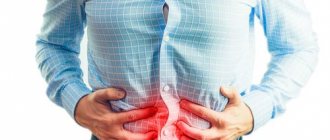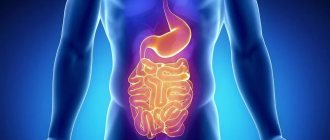Being in an interesting position, the expectant mother begins to be extremely careful about her own well-being, since the woman’s well-being is reflected in the condition of the baby. There is no need to worry that discomfort and heaviness in a pregnant woman’s stomach are symptoms of some serious and dangerous illness.
In most situations, this is a manifestation of physiological changes occurring in a woman’s body during pregnancy. But the pathological nature of unpleasant sensations cannot be excluded, therefore they cannot be ignored.
Is heaviness in the stomach common during pregnancy?
Although the period of carrying a baby should ideally not be accompanied by severe discomfort, expectant mothers often suffer from eating disorders. During pregnancy, heaviness in the stomach can appear at any stage, and each time the reasons are different, because they are related to the ongoing development of the baby.
In the very early stages, the expectant mother’s body experiences a whole range of changes in almost all organs and systems. The intensity of enzyme production and acid content change. This does not mean at all that you have to resign yourself and endure the heaviness in your stomach. There are remedies that will relieve a pregnant woman from the disease.
Prevention
It is impossible to completely eliminate heaviness in the stomach during pregnancy, however, by applying the following recommendations in practice, you can reduce the intensity of this clinical manifestation:
- proper nutrition, it is very important in this situation to consume enough vitamins and minerals;
- elimination of stress, psycho-emotional stress;
- taking only medications prescribed by a doctor;
- excluding the use of alcoholic beverages and surrogates.
In addition, it is important to undergo preventive examinations with doctors in a timely manner and not self-medicate.
Why is this condition dangerous?
In most cases, the disease does not indicate the presence of a serious illness. When discomfort first appears in the expectant mother, she may begin to panic, fearing harm to the baby. If there is constant severity and serious concerns, the expectant mother should make an appointment with a gastroenterologist. The doctor will conduct the necessary examination and give valuable recommendations.
If discomfort appears suddenly, is accompanied by fever, severe abdominal pain or repeated vomiting that does not bring relief, you should immediately seek medical help to prevent possible complications from both the mother and the child.
And now we need to talk about the same problem, but at a later date
In the later stages, there should be no stomach pain or heaviness. It is not normal! In the second half of pregnancy, this problem is caused by other reasons not related to toxicosis. Heaviness in the stomach in the last stages may occur due to the growth of the uterus. After all, the baby needs more and more space in the mother’s belly and the uterus grows to give the baby more space. Gradually, the uterus displaces the organs located in the abdominal cavity.
At the twentieth week and beyond, such pain does not go away, even after many long hours. And with this pain and heaviness you have to walk all day, and possibly more. Often these terrible and unpleasant pains in the abdomen, which were already present in the early stages, but then they appear and in the end are accompanied by heartburn, belching and flatulence.
How to get rid of this problem - useful tips
When an expectant mother encounters this condition for the first time, she can try to overcome the disease on her own. To cope with abdominal discomfort, you will have to adhere to a special diet, the purpose of which is to relieve the digestive organs. Therefore, a special eating regimen is created, and harmful foods that are difficult to digest are eliminated.
Be sure to exclude from the diet:
- Fried, smoked, sour, spicy food.
- Milk.
- Sweets.
- Fast food.
- Carbonated drinks.
- Coffee.
These foods increase stomach acidity and can also cause abdominal pain and bloating. Do not overdo it: a pregnant woman should not starve; nutrients must be supplied to the body in a timely manner in the required quantities. Portions should be small, meals should be frequent, at least 6 times a day.
In the morning after waking up, it is recommended to eat something light - crackers or bread. During the day, it is advisable to eat liquid or soft foods - broths, soups and cereals. You should not give up eating vegetables, fruits, meat and fish products, as well as dairy products.
If the expectant mother has bad habits such as smoking, eliminating this cause will save you from heaviness and discomfort in the stomach.
Some pregnant women use traditional medicine recipes, but it should be understood that some seemingly harmless herbs can cause harm to the fetus and even lead to miscarriage. Therefore, before using the recipe, it is advisable to consult a qualified specialist.
Let's look at the most popular "grandmother's recipes":
- Herbal decoctions: use chamomile, mint, yarrow, flax. Plants relieve the feeling of heaviness in the stomach. Take several sheets and pour boiling water over them. Let it brew, strain and drink in small portions.
- Licorice infusion: recommended for use with increased stomach acidity. To prepare the product, take 100 g of plant root and pour a glass of boiling water. Make an infusion and add a glass of cool boiled water. The infusion is taken three times a day, 3 tbsp. l.
- Melissa decoction : 3 tsp. crushed leaves of the plant are poured into a glass of boiling water. Let it brew for 5 minutes. Take the product 2-3 times a day.
- Water with lemon: just add citrus fruit to non-carbonated boiled liquid and take it if you feel indigestion in the stomach. This remedy is especially effective at the beginning of pregnancy, when early toxicosis occurs.
Let's talk about early pregnancy again
2-3 weeks after conception, many women experience toxicosis. This is a complication of pregnancy. It is expressed not only by nausea and vomiting, as many believe. Some pregnant women say that they feel heaviness and discomfort in the stomach in the first trimester of pregnancy. Unpleasant sensations intensify after eating and can last about two to three hours, or even more. I wonder what causes the appearance of such symptoms?
The occurrence of heaviness in the stomach appears due to a hormonal imbalance in the woman’s body in which the fetus was born. Under the influence of progesterone, the walls of the main organ of the digestive system relax. Food passing through the stomach stays there much longer than it should. If this kind of stagnation suddenly occurs, it leads to unbearable pain in the upper abdomen, as well as in the stomach. Most women and girls experience increased nausea and vomiting after eating. Heaviness in the stomach during toxicosis is not associated with any diseases of the digestive tract. All unpleasant sensations go away on their own and there is no need to try to drown them out with pills. Taking pills can only ruin your stomach. After all, the pills are very harmful and taking them on a regular basis is often not advisable, especially during pregnancy. Although all doctors prescribe them in large quantities. Toxicosis will go away after 12-14 weeks of pregnancy. We noticed how different people’s opinions differ about whether heaviness in the stomach is still a disease or not and you can easily get rid of it.
What medications can you take to avoid harming your baby?
Self-medication for the expectant mother is strictly prohibited. Before use, you should definitely consult a doctor who will tell you exactly what to treat and what you can drink during pregnancy. If necessary, the specialist will refer the pregnant woman to a gastroenterologist.
Many medications are undesirable to use during pregnancy. These drugs include enzyme preparations: Pancreatin, Festal, Creon. The instructions for use say that they are prescribed only when the therapeutic effect for the expectant mother outweighs the possible threat to the child.
Antacids (Gaviscon, Maalox) are approved for use. They neutralize acid and coat the gastric mucosa, eliminating belching during pregnancy. In case of increased acidity, exacerbation of gastritis and ulcers, Omeprazole is recommended, which reduces the production of hydrochloric acid.
If heaviness appears in the abdomen, accompanied by pain, the doctor may prescribe No-shpa. When the disorder is caused by stress or excessive nervousness of the expectant mother, take sedatives - Motherwort, Valerian.
To increase motor function, Motilak is used, which acts on organ peristalsis. Thanks to the drug, the transit time of food is accelerated, and the feeling of discomfort is eliminated.
Watch a video on the topic of gastric disorders in a pregnant woman:
How can you alleviate the condition during pregnancy?
If stomach pains do not bother you very much and they rarely go away, then it is better not to turn to medications, because you can endure this pain without spoiling your stomach by pushing a lot of unknown drugs into yourself.
Once again, we repeat the rules by which you can ease your suffering during this difficult period
- It's better to cook small portions of food for yourself rather than eat too much.
- Eat as often as possible, that is, many times a day. Around 6-10.
- Drink more pure water, but definitely not carbonated (up to 2 liters per day).
- You should avoid spicy, salty and fried foods. Because it is poorly digested and is harmful to health. We must be for healthy eating
- Don't drink carbonated drinks.
- You should not buy or consume foods that cause excessive gas formation in the intestines.
- Under no circumstances should you starve, it is too harmful for the body.
- Try to move more during the day and maintain a healthy lifestyle.
- If you experience severe discomfort, you should consult a special gastroenterologist.
Do not take medications without a doctor's prescription! After all, many drugs are prohibited for pregnant and lactating women to drink, and such treatment methods can cause enormous harm to the fetus. After the examination, the doctor will give his recommendations on how to alleviate the condition during pregnancy. I hope expectant mothers will use these tips. Learn to distinguish toxicosis, during which pain and heaviness in the stomach occurs, from serious illnesses and you should consult a doctor.
Prevention of heaviness in the stomach during pregnancy
It is impossible to prevent the appearance of heaviness in the epigastrium during pregnancy, taking into account the reasons for the development of the condition. However, there are rules to reduce discomfort and discomfort in the abdomen.
These rules are:
- Exclusion of fatty, fried, smoked foods and semi-finished products. A pregnant woman's body experiences a double load, so it is extremely important to take care of yourself and not overexert yourself with unhealthy and heavy food.
- Avoiding excessively cold or hot foods.
- Fractional meals: you need to eat often, but in small portions.
- Mandatory inclusion in the diet of soups and broths, as well as fermented milk products.
- Try to peel fruits to make it easier for the gastrointestinal tract to digest.
- Avoiding daytime naps after meals during pregnancy: It is recommended to take short walks instead. This makes food easier to digest and the stomach is not overloaded.
- Stop eating 2 hours before bedtime.
The expectant mother often experiences indigestion, which causes discomfort and anxiety. In most cases, abdominal discomfort is considered normal and does not require medical attention. Most often, this does not threaten the baby’s health in any way, and as soon as the baby is born, the feeling of heaviness in the woman’s stomach will stop.
In early pregnancy
In the first months of pregnancy, a woman’s body undergoes global hormonal changes, accompanied by heaviness in the stomach and other symptoms of indigestion. The famous toxicosis of pregnant women arises, which, without exaggeration, can turn a healthy, blooming woman into a sick sufferer who does not stray far from the toilet. A feeling of heaviness and fullness in the stomach during toxicosis occurs immediately after eating, even if its volume was minimal or the pregnant woman drank only juice or water.
The causes of unpleasant sensations may be: a decrease in the acidity of gastric juice, a change in the innervation of the digestive organs, which leads to a deterioration in intestinal motility, as well as a disruption of the normal intestinal microflora or an exacerbation of chronic diseases of the digestive system.
Changes in the acidity of gastric juice and disruption of innervation occur due to hormonal changes in the body and this process cannot be influenced in any way; a pregnant woman can only alleviate her condition by following a diet and adhering to the principles of fractional nutrition. Dysbiosis and exacerbation of chronic diseases during pregnancy develop due to decreased immunity and severe stress that the body experiences during this period. In such situations, the disease should not be started under any circumstances, as this can have a harmful effect on the development of the child. If the feeling of heaviness in the abdomen is accompanied by pain, severe heartburn, or the pregnant woman also has symptoms of thrush or stomatitis, she should urgently seek medical help, undergo an examination and, if necessary, undergo treatment by taking medications approved during pregnancy.
Stomach pain
Heartburn accompanies stomach cramps no less often than nausea. The growing uterus puts pressure on the internal organs. By the second trimester, pressure on the stomach increases. The stomach is additionally compressed by tight clothes, so pregnant women should choose a comfortable cut of dresses.
Manifestation of pain
The causes of pain in the stomach are associated with stress, gastritis, toxicosis, and other diseases. The pain manifests itself more often in the left hypochondrium. May be localized in the navel area.
Unpleasant feelings in the stomach begin unexpectedly and go away suddenly. The woman experiences discomfort without pain or shingles. The boy or girl inside the mother is safe. Anxiety about the condition of a representative of the fair sex when carrying a baby appears when:
- Toxicosis occurs;
- The pain is spastic in nature;
- The temperature rises;
- Blood is excreted in the stool;
- A pregnant woman feels sick;
- Painful sensations are accompanied by vomiting;
- Diarrhea is temporary or permanent;
- The pregnant woman's health is accompanied by dizziness, drowsiness, and lethargy.
Source of nausea and abdominal pain
Nausea and stomach pain can have deep causes. What precedes the development of pain syndrome:
- Dairy intolerance. There is not enough lactase in the pregnant woman’s enzyme system, making it difficult for milk to be digested and absorbed in the body. Pain and discomfort may occur in the stomach, provoking allergic reactions.
- Sometimes prenatal vitamins make you sick.
- Folic acid can cause an unpleasant feeling. Taking the drug is discussed with the obstetrician, and if folic acid makes you sick, it may be discontinued.
- Gastritis of various etiologies. Bacteria, infections, viruses cause stomach cramps in a woman with or without heartburn. Gastritis provokes overwork, stressful situations, muscle spasms of the abdominal area. A pregnant woman suffers from an ulcer, she is tormented by constipation - this also leads to gastritis.
- Indigestion due to a viral or bacterial infection. The process, in addition to cramps and nausea, causes symptoms - vomiting, weakness, intestinal upset. Poisoning with expired foods provokes diarrhea after eating. Signs of poisoning disappear after three days.
- Appendicitis. Inflammation of the appendage of the cecum is a common sign of stomach pain. Tension in the lower abdomen is projected onto the epigastric zone.
- Acute or chronic inflammation of the liver, pancreas, gall bladder. A pregnant woman may feel bitterness in her mouth and a suction sensation in the epigastric area.
- The problem of the functioning of the genitourinary system. Changes in the functioning of the bladder, ureters, and kidneys project defects onto the epigastric region. A woman may experience nagging pain in any trimester of pregnancy.
Clinical manifestations of the problem during pregnancy
Discomfort in the gastrointestinal tract usually accompanies toxicosis.
The first signs of a problem appear 2-3 weeks after pregnancy. They appear more intensely after eating food and can persist for several hours. Why does the problem appear in early pregnancy? The condition is explained by serious hormonal changes and the predominance of progesterone in the body. The hormone relaxes the walls of the gastrointestinal tract, promoting stagnation of food in it. Discomfort in the upper abdomen is complemented by:
- bloating;
- pain;
- nausea.
Signs of the disorder disappear on their own at 12-14 weeks and do not require symptomatic therapy.
Heaviness in the stomach during pregnancy in the second trimester is manifested due to the growing pressure of the uterus on the stomach. A compressed organ reacts to discomfort:
- heartburn;
- abdominal pain;
- a feeling of bitterness in the mouth.
Important! Discomfort in the lower abdomen in the later stages may indicate the onset of labor. A woman should call an ambulance if the symptom persists for more than 3 hours. In this case, taking painkillers is prohibited.
Emergency medical attention is required if abdominal discomfort is accompanied by:
- cramps, vomiting, uterine bleeding;
- increased temperature;
- shortness of breath;
- profuse sweating;
- constipation
Types of pain during pregnancy
An ordinary person cannot always cope with pain, having the opportunity to undergo prescribed procedures and take medications. What can we say about a pregnant woman, when her head is filled with thoughts about home, work, a child, and then her stomach hurts. Internal organs change location due to the enlarged uterus and are forced to work abnormally.
Symptoms of pain indicate an exacerbation of a chronic or acquired disease. When carrying a baby, a woman suffers, for example, from gastritis. She feels full, her stomach becomes tense and heavy. These signs appear in women with other diseases: cholecystitis, biliary dyskinesia, pancreatitis, and so on.
Displacement of the uterus in the second half of pregnancy changes the usual course of food. The bolus of food is compressed, which causes gastric juice to reflux into the upper esophagus. The process is accompanied by bitterness in the mouth and other unpleasant sensations.
At week 4, the fetus puts pressure on joints, muscles, and ligaments. If the pain radiates to the stomach, accompanied by chills with vomiting and nausea, you should consult a doctor. The fourth week of pregnancy is a time when it is easy to lose your baby.
At the 7th month of pregnancy, heaviness is felt in the lower back and abdomen due to stretching of the muscular-ligamentous apparatus. The uterus begins to prepare for childbirth: false contractions can be easily distinguished from real ones by their painlessness. If a spasm occurs in the abdomen during the 8th month of gestation, consult a doctor immediately, as the placenta may detach. Drawing, cutting, spastic pain in any month is a reason to be wary.
How does pain manifest itself?
Gastric spasm in the peri-umbilical region indicates an inflammatory-dystrophic change in the gastric mucosa. Gastritis can be accompanied by colitis and inflammation of the duodenum. The pain is dull and prolonged. Ulcerative processes cause sharp short-term attacks with indomitable cramp-like pain.
In order for a doctor to diagnose the disease and prescribe adequate treatment, a woman needs to track what and when she ate. Pain during gastritis differs from pain perception during cholecystitis. A stomach ulcer will manifest itself within an hour and a half from the start of eating. A duodenal ulcer will respond within no later than two hours.
If the stomach hurts before eating, the woman probably developed duodenitis or a duodenal ulcer during pregnancy. Foods containing acid – pickled vegetables, canned food – provoke colic in the stomach. Uncontrollable pain occurs with the consumption of coarse fibers, cellulose, and grain bread.










